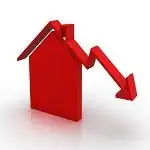
A “correction” in real house prices is under way, according to FNB. Real house prices take account of the impact of inflation on house price growth.
FNB said the average real rate of decline in house prices in October was -3.5 percent after adjusting house price increases by the consumer price index (CPI), given that CPI inflation was above 6 percent.
FNB’s latest house price index revealed that nominal house prices grew year-on-year by 1.9 percent last month from the revised rate of 2.6 percent in October, which represented the seventh consecutive month of slowing year-on-year house price growth.
It said CPI data for November was not yet available, but the real decline in house prices for last month “promises to be even more significant”.
John Loos, a household and property sector strategist at FNB, said the average house price in real terms had declined by -4.3 percent since December last year.
Loos added that real house prices were -21.9 percent down from the end of 2007, the boom time real house price high point.
“Looking back further though, the average real price currently remains 62.1 percent above the January 2001 level, back in the early years of the index, before the boom time price surge really kicked in.
“Real house price levels thus remain high, compared to pre-boom time levels, the boom having been from early last decade to the end of 2007,” he said.
Loos added that the pace of the slowdown in nominal house price growth in the past seven months had been noticeably more rapid than any slowing growth phase of the past about five years.
He said the year-on-year rate of house price inflation as recently as in April this year was a significantly stronger 6.9 percent.
Loos said that while the nominal year-on-year house price inflation rate managed to hang on to some low positive growth, FNB’s house price index had on a month-on-month seasonally adjusted basis shown four consecutive months of price decline.
From a -0.33 percent month-on-month decline in October, it declined last month by a similar 0.31 percent.
Loos said the periodic short dips in the month-on-month rates of change, to either lower house price inflation or most recently deflation, appeared to broadly coincide with the short-term fluctuations in the economy’s performance.
He said the readings of FNB’s house price index for both year-on-year and month-on-month house price growth were not too surprising, given the multiyear stagnation in the South African economy to growth of close to zero.
“The lagged impact of interest rate hiking, too, is probably still filtering through. On top of this, recent readings of the FNB consumer confidence index have pointed to consumers expressing concern regarding future economic performance,” he said.
However, Loos said FNB expected the alleviation of drought conditions to boost agricultural growth next year and mining to be assisted by some support from mildly better export commodity prices. He said FNB was forecasting economic growth of 1 percent for next year, which was unlikely to make a meaningful difference to residential demand and therefore little residential supply constraints next year.
This would result in a year of low house price inflation, close to an average of 3 percent for the year, which would translate into an average house price decline in real terms.
Article courtesy of IOL Property
Author: IOL Property

